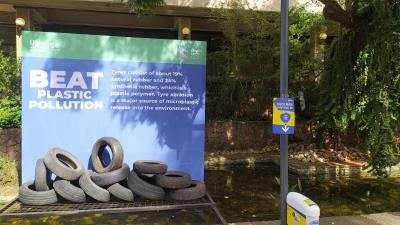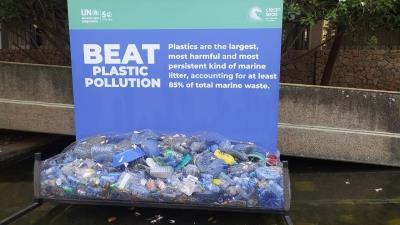(MENAFN- IANS)




By Vishal Gulati
Nairobi, March 1 (IANS) With several draft resolutions submitted by nations, including India, the world is inching closer to the historical resolution to end plastic pollution that is expected to be gavelled with the adjournment of the resumed fifth session of the UN Environment Assembly (UNEA-5.2) at the closing plenary of the Assembly on Wednesday.
The assembly that began here on Monday is being attended by more than 3,400 in-person and 1,500 online participants from 175 UN member states, including 79 ministers and 17 high-level officials.
A spokesperson for the UN Environment Programme (UNEP) told IANS on Tuesday that the decision will be taken following several draft resolutions submitted by the governments of Peru, Rwanda, Japan and India.
The anticipated resolution may be the most important green deal since Paris accords, said the spokesperson.
UNEP's Executive Director Inger Andersen outlined what to expect at UNEA-5.2, including progress on halting plastic pollution, stopping harmful chemicals in agriculture and deploying nature to find sustainable development solutions.
Delivering the national statement on Tuesday at the plenary of the UNEA-5.2, Leena Nandan, Secretary with the Ministry of Environment, Forest and Climate Change, said that India is committed to the United Nations Framework Convention on Climate Change (UNFCCC) and its Paris Agreement, based on the principles of equity, common but differentiated responsibilities and respective capabilities in the light of national circumstances.
On plastic pollution, she said India is committed to address plastic pollution, including marine plastic pollution, to reduce the adverse impact on terrestrial and aquatic ecosystems and human well-being.
'India had piloted a resolution on addressing single-use plastic product pollution in the fourth United Nations Environment Assembly held in 2019, bringing global focus on the issue.
'Under the leadership of Prime Minister Narendra Modi, India has taken resolute steps. The government has notified the guidelines on extended producers' responsibility on plastic packaging. Also, the government has put in place a ban on identified single-use plastic items, which have low utility and high littering potential,' Nandan said.
President of UNEA-5 and Norway's Minister for Climate and Environment, Espen Barth Eide, in his remarks on the opening day had said, 'Our assembly gathers at a moment of severe geopolitical turmoil. More than ever, we must demonstrate that multilateral diplomacy can deliver.
'Plastic pollution has grown into an epidemic of its own. Paradoxically, plastics are among the most long-lasting products we humans have made -- and frequently, we still just throw it away. Plastic is a product that can be used again, and then over and over again, if we move it into a circular economy. I am convinced that the time has come for a legally binding treaty to end plastic pollution.'
Inger Andersen, Executive Director of the UN Environment Programme (UNEP), said: 'Over the last week, we have seen tremendous progress on negotiations towards an internationally legally binding instrument to end plastic pollution. I have complete faith that once endorsed by the assembly, we will have something truly historic on our hands.'
'Ambitious action to beat plastic pollution should track the lifespan of plastic products -- from source to sea -- should be legally binding, accompanied by support to developing countries, backed by financing mechanisms, tracked by strong monitoring mechanisms, and incentivising all stakeholders -- including the private sector,' Andersen added.
The resolution on plastic pollution, as well as the other pressing environmental issues, will be formally decided by the member states in the closing plenary meeting of the assembly on Wednesday.
The UN Environment Assembly meets biennially to set priorities for global environmental policies and develop international environmental law; decisions and resolutions taken by the member states at the Assembly also define the work of UNEP.
(Vishal Gulati can be contacted at )
--IANS
vg/arm
MENAFN01032022000231011071ID1103783722
Legal Disclaimer:
MENAFN provides the information “as is” without warranty of any kind. We do not accept any responsibility or liability for the accuracy, content, images, videos, licenses, completeness, legality, or reliability of the information contained in this article. If you have any complaints or copyright issues related to this article, kindly contact the provider above.